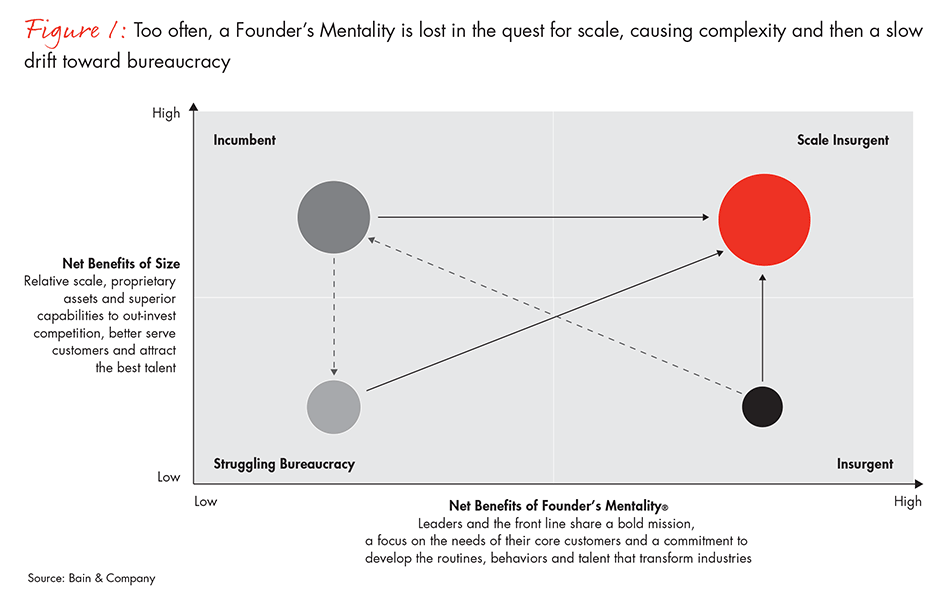Brief

Most fast-growing companies aim to do more than simply increase revenue year after year; they aspire to global leadership in their industries. That kind of success requires sustainable growth: As a company’s revenues and customers grow, so must its capabilities. These companies often start as insurgents, led by ambitious, entrepreneurial founders who break the rules. They are fast, agile and adaptable. They thrive on a unique understanding of their customers and their local markets. They hate complexity and work tirelessly to keep their organizations and offerings simple. But they also know that to win in the long term, they need the cost advantages and broader scope of global incumbents. And, in too many cases, they eventually accept a troubling trade-off: In achieving scale, they lose what we call the Founder’s Mentality®—the very core strengths and values that helped these insurgents succeed against the odds.
That isn’t surprising. The history of most successful Western businesses has been to move in a straight line, from insurgent to incumbent. And often, that’s where the growth story ends (see Figure 1). Having misplaced their innate bias for simplicity, they now pile on complexity in an increasingly futile effort to reignite growth.
Chris Zook, coauthor of The Founder's Mentality: How to Overcome the Predictable Crises of Growth and partner in the Global Strategy practice, discusses three ways companies can successfully reverse stall-out.
For leaders of these large incumbent companies, the real dilemma is how to revive their original Founder’s Mentality before the burdens of size and complexity drag them down. Leaders of insurgents, meanwhile, are searching for a different road to growth—one that rejects the so-called best practices of the incumbents, yet still delivers global scale.
It is possible. Companies stepping onto the global stage can resist the natural forces pushing them off course. Multinational corporations that have succumbed to those forces can regain their way—on their own or through creative partnerships with insurgents. It’s not easy, but as we show in our book Repeatability, the tools they need already exist inside their own companies. For CEOs, the question is, Which path to Scale Insurgency is my company on?

Bain’s Founder’s Mentality 100 (FM100) initiative—a close partnership with leading developing market companies—and our research on Repeatable Models® provide insights into how companies can maintain a Founder’s Mentality as they grow.
To do so, companies must avoid the forces that push them west on our grid toward the incumbent quadrant, toward that troublesome trade-off. We call these forces the “westward winds.”
How to resist the “westward winds” that push insurgents off course
|
Westward winds |
Description |
Actions to counter |
|
The unscalable founder |
A founder’s inability to adapt his or her behaviors as a company evolves results in founder issues that disrupt the leadership agenda |
|
|
Lost voices of the front line |
As leadership focus shifts towards internal issues, the voice of the customer fades from decision making and the frontline employee is forgotten |
|
|
The erosion of accountability |
Loss of the owner's mindset (personal focus on cost and risk management) leads to rising costs and unnecessary risks |
|
|
Revenue grows faster than talent |
The company drifts to the "time of flawed systems" as the founder’s attempt to institutionalize core capabilities backfires, resulting in runaway bureaucracy and an exodus of top talent |
|
Let’s examine one of these winds: Revenue grows faster than talent. Behind the early success of most insurgent companies are dynamic, talented individuals who understand the company’s mission clearly and implement it passionately. This team makes up for any gap in skills with heroic efforts.
However, fast-growing insurgents eventually discover that this is unsustainable—the original team begins to burn out. New projects fail. To address the talent shortage, the company hires teams of professional managers with little frontline experience. Often, the company also turns to a strategy common among incumbent rivals: It tries to codify the founding mission though rule books and policies.
For a while, this seems to work. A more process-oriented company can plug a talent gap by hiring second-tier talent who are comfortable in that environment. But leaders soon discover that the result is a bureaucratic company filled with planners. The antidote to this problem— and to the other westward winds—is a ruthless focus on the core and the Repeatable Models that define it. Expanding these models creates bigger jobs for the best talent and offers a powerful tool for training new employees. It preserves the mission shared by the early team and ensures that it cascades down to the front line.
To learn more about how winning companies combat the westward winds, go to www.foundersmentality.com.
Founder's Mentality®, Repeatable Models® and Great Repeatable Models® are registered trademarks of Bain & Company, Inc.
James Allen and Chris Zook are partners at Bain & Company and co-leaders of Bain’s Strategy practice. They’re based in London and Amsterdam, respectively. Dunigan O’Keeffe is a partner in Bain’s Mumbai office and leads Bain’s Strategy practice in Asia and the Pacific.


Founder's Mentality
Fast-growing companies can become global leaders without losing the values that helped them succeed. Bain’s research explores how large incumbents can also reignite their growth by recapturing their Founder’s Mentality®.